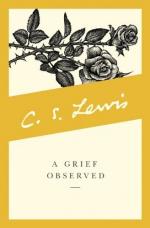
|
| Name: _________________________ | Period: ___________________ |
This test consists of 15 multiple choice questions and 5 short answer questions.
Multiple Choice Questions
1. In the second chapter, what person does the author come to realize he had little confidence in?
(a) H.
(b) B. R.
(c) The author's brother.
(d) The author's children.
2. Who is the main character in the book?
(a) The two sons.
(b) H.
(c) C. S. Lewis.
(d) God.
3. If death is real, what does the author conclude about it?
(a) That God does not care if people die.
(b) That the author has no reason to keep living.
(c) That its existence is irrelevant.
(d) That it matters more than anything.
4. What does the author think lessens the horror of a terminal illness?
(a) Studying about the disease.
(b) When death finally comes.
(c) Contracting it oneself.
(d) Living with it.
5. Where does the author feel his loss the most?
(a) In his home.
(b) In his body.
(c) At the park.
(d) At work.
6. Who causes the author the most confusion?
(a) His friends.
(b) His sons.
(c) God.
(d) Himself.
7. What does the author say happens when we experience any kind of pain?
(a) It pulls us toward it.
(b) We run from it.
(c) We barely notice it.
(d) We need to share it with others.
8. How does the author picture the "eternal somethings" that he and H. would be after this life?
(a) Angels.
(b) Emptiness.
(c) Spheres.
(d) Corpses.
9. What did H. say so often?
(a) "C'est la vie."
(b) 'Don't let me die."
(c) "Alone into the alone."
(d) "I will always love you."
10. How does the author know that the end of this life is all about heavenly reunions?
(a) He had a vision.
(b) He and H. discussed it.
(c) It says so in the Bible.
(d) Reality never repeats.
11. Of what emotion does grief remind the author?
(a) Gratitude.
(b) Hatred.
(c) Acceptance.
(d) Fear.
12. What ancient civilization thought that embalming the dead lessened death's effect?
(a) Egyptian civilization.
(b) Grecian civilization.
(c) Roman civilization.
(d) Celtic civilization.
13. How does the author close the second chapter?
(a) With surrender to the grief.
(b) With eager hope.
(c) With prayer.
(d) Without optimism.
14. What is H.'s real name?
(a) Helen Lewis.
(b) Norma Lewis.
(c) Sylvia Plath.
(d) Joy Gresham.
15. What happens when the author tries to remember H.'s face?
(a) His memory is crystal clear.
(b) Her face is not clear.
(c) He sees her as if she is still alive.
(d) He cannot recall what she looked like.
Short Answer Questions
1. How does Lewis begin his reflections?
2. What accounts for a mother's response to comforting words regarding a lost child?
3. Who reacts in shame when the author talks about his wife?
4. Who tries to comfort Lewis with a biblical story about Jesus?
5. In what sense does the author agree that H. is with God, as some friends say?
|
This section contains 482 words (approx. 2 pages at 300 words per page) |

|




